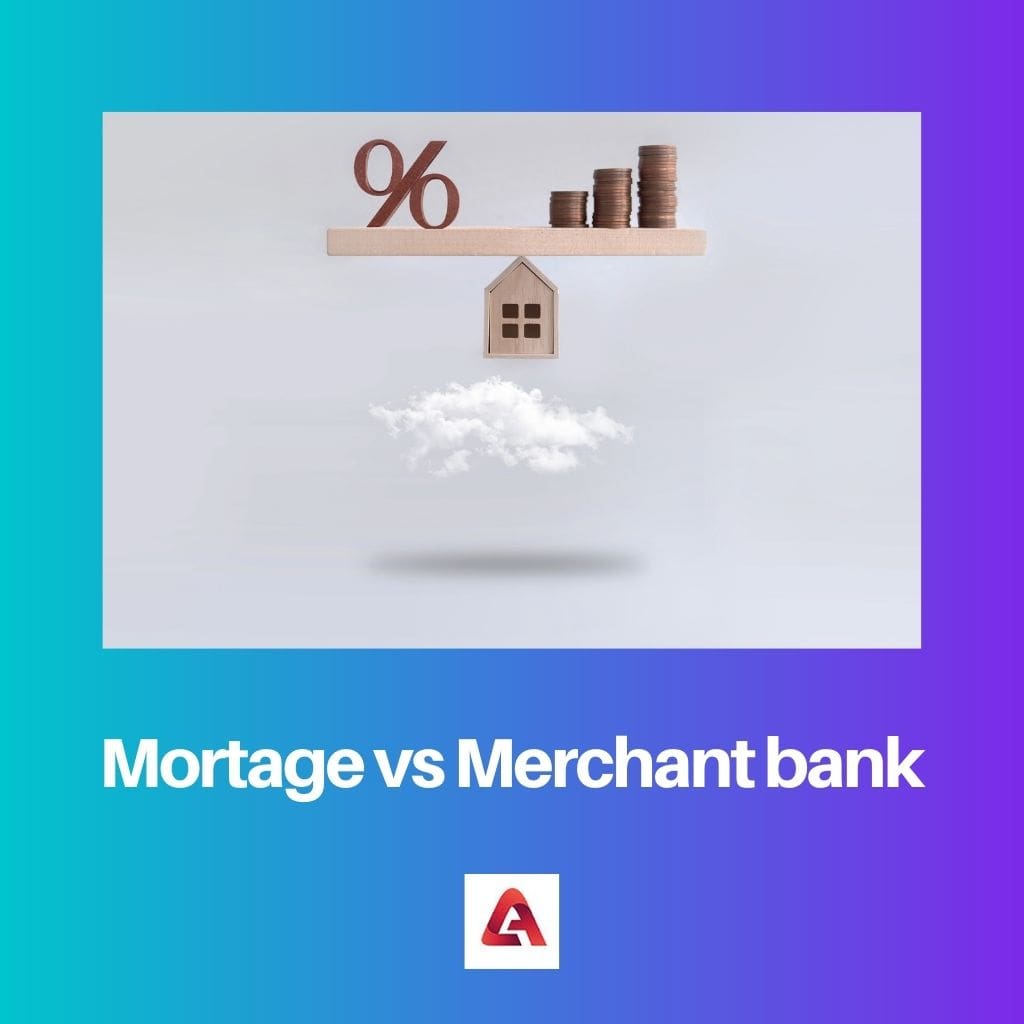A mortgage is a loan specifically for purchasing real estate, where the property serves as collateral. It is typically provided by a financial institution, like a bank. On the other hand, a merchant bank is a financial institution that offers a range of services, including investment banking, advisory, and capital raising, catering to businesses rather than individual consumers.
Key Takeaways
- A mortgage is a loan secured by real estate property, where the borrower agrees to repay the loan with interest over a specified period.
- Merchant banks provide specialized financial services to businesses, including corporate advisory, underwriting, and raising capital through debt or equity offerings.
- Mortgages are a specific type of loan focused on real estate financing, while merchant banks offer businesses a range of financial services.
Mortgage vs Merchant Bank
The difference between Mortgage and Merchant Bank is that Mortgage is a bank or company which offers a loan with their funds or from warehouse lenders. A merchant bank is an institution that provides finance, underwriting, business loans, and advice or consultancy on finance.

A mortgage is a bank, company, individual or institution specialising in mortgage loans. A mortgage bank never holds any deposit; it originates and services the loan.
A merchant bank is a financial institution that offers Financial Services or Advisory, underwriting and business loans.
Comparison Table
| Feature | Mortgage Lender | Merchant Bank |
|---|---|---|
| Primary Function | Provides loans for purchasing real estate | Offers financial services for businesses and high-net-worth individuals |
| Loan Type | Secured loan (backed by the property) | Debt or equity financing, often for large transactions |
| Clientele | Individuals buying homes | Corporations, governments, and wealthy individuals |
| Services Offered | Originates, funds, and services mortgages | Underwriting, mergers & acquisitions (M&A) advisory, capital raising, wealth management |
| Loan Size | Typically smaller (depending on property value) | Larger and more complex transactions |
| Risk Tolerance | Lower risk due to collateral | Higher risk due to complex financing and reliance on borrower’s financial health |
| Availability | Widely available through banks, credit unions, and online lenders | Limited availability, typically requires a long-standing relationship or significant assets |
| Regulation | Heavily regulated by government agencies | Less strictly regulated, but still subject to some financial regulations |
What is Mortgage?
Key Components of a Mortgage
- Principal:
- The principal is the initial amount borrowed to purchase the property. It represents the actual cost of the home or property.
- Interest:
- Interest is the cost of borrowing money and is expressed as a percentage of the principal. It is the primary source of profit for lenders.
- Down Payment:
- The down payment is the upfront payment made by the borrower, typically a percentage of the property’s purchase price. A higher down payment often results in lower monthly mortgage payments.
- Term:
- The mortgage term is the duration of the loan. Common terms include 15, 20, or 30 years. Shorter terms generally have higher monthly payments but lower overall interest costs.
Types of Mortgages
1. Fixed-Rate Mortgages
A fixed-rate mortgage maintains the same interest rate for the entire loan term, providing predictability for borrowers. Monthly payments remain constant, making budgeting more manageable.
2. Adjustable-Rate Mortgages
Adjustable-rate mortgages (ARMs) have interest rates that may change periodically based on market conditions. Initial rates are typically lower than fixed-rate mortgages, but they can fluctuate, impacting monthly payments.
3. Government-Backed Mortgages
Government-backed mortgages, such as FHA (Federal Housing Administration) and VA (Department of Veterans Affairs) loans, offer specific benefits and are insured by the government, making them more accessible to certain individuals.
Mortgage Process
1. Pre-Approval
Before house hunting, prospective buyers seek pre-approval from lenders. This involves a comprehensive financial assessment to determine the maximum loan amount for which they qualify.
2. Property Appraisal
The lender conducts a property appraisal to assess its value and ensure it aligns with the loan amount. This step protects both the borrower and the lender from overvalued properties.
3. Loan Approval and Closing
Once the property appraisal is satisfactory, the lender approves the loan. The closing process involves signing the necessary documents, transferring ownership, and disbursing funds to complete the purchase.
Repayment and Risks
1. Repayment Options
Borrowers typically make monthly payments that include both principal and interest. Some mortgages offer flexibility in repayment options, allowing for additional payments to reduce the overall interest paid.
2. Risks and Foreclosure
Failure to make timely mortgage payments can lead to foreclosure, wherein the lender takes possession of the property. Borrowers should be aware of the potential risks and work with lenders to explore alternative solutions if financial difficulties arise.

What is Merchant Bank?
Roles and Functions of Merchant Banks
Merchant banks are involved in various financial activities, serving as intermediaries between different parties in the financial markets. Their roles and functions include:
1. Investment Banking
Merchant banks are prominent players in investment banking, facilitating capital raising activities for corporations. This involves underwriting securities, such as stocks and bonds, and assisting in initial public offerings (IPOs). They also provide advisory services for mergers and acquisitions (M&A), helping clients navigate complex transactions.
2. Project Financing
Merchant banks engage in project financing, where they structure and arrange financing for large-scale projects. This can include infrastructure developments, real estate projects, and other capital-intensive ventures. The bank evaluates the feasibility of projects and secures funding from various sources.
3. Advisory Services
Offering financial advice is a key function of merchant banks. They provide strategic advice to corporations on matters such as capital structure, risk management, and financial restructuring. Advisory services also extend to wealth management and estate planning for high-net-worth individuals.
4. Foreign Exchange Services
Merchant banks often facilitate international trade by providing foreign exchange services. They assist clients in managing currency risks associated with cross-border transactions. This includes currency hedging and offering advice on optimal foreign exchange strategies.
5. Private Equity and Venture Capital
Merchant banks may engage in private equity and venture capital activities. They invest in promising startups and companies with growth potential. This not only provides capital to these enterprises but also allows the merchant bank to benefit from the success and growth of the invested companies.
Key Characteristics of Merchant Banks
1. Specialization in Financial Services
Merchant banks specialize in financial services beyond traditional banking activities. Their expertise lies in investment banking, advisory services, and other complex financial transactions.
2. Relationship-Oriented Approach
Merchant banks often adopt a relationship-oriented approach with their clients. Due to the nature of their services, building strong and lasting relationships is crucial for success.
3. Risk Management Expertise
Given their involvement in diverse financial transactions, merchant banks possess expertise in risk management. They assess and manage various types of risks associated with the financial markets.
4. Limited Retail Banking Activities
Unlike commercial banks, merchant banks have limited or no involvement in retail banking services. Their focus is primarily on catering to the financial needs of corporations and high-net-worth clients.
Regulation of Merchant Banks
1. Regulatory Oversight
Merchant banks are subject to regulatory oversight by financial authorities in the jurisdictions where they operate. Regulations are in place to ensure the stability and integrity of financial markets and to protect the interests of clients.
2. Compliance Requirements
Compliance with regulatory requirements is a key aspect of operating as a merchant bank. These institutions must adhere to standards related to capital adequacy, risk management, and reporting.

Main Differences Between Mortgage and Merchant Banks
- Nature of Operations:
- Mortgage Banks: Primarily engaged in providing loans for real estate purchases. They specialize in mortgage-related services, such as originating, servicing, and selling mortgage loans.
- Merchant Banks: Involved in a broader range of financial services, including underwriting, advisory services, and capital raising. They often deal with corporate clients and provide a variety of financial solutions beyond mortgages.
- Focus on Clients:
- Mortgage Banks: Mainly serve individual homebuyers by providing mortgage loans for residential properties.
- Merchant Banks: Typically cater to corporate clients, offering financial services such as investment banking, mergers and acquisitions, and capital market activities.
- Risk Exposure:
- Mortgage Banks: Primarily exposed to risks related to the real estate market, such as fluctuations in property values and changes in interest rates.
- Merchant Banks: Face a broader array of risks, including market risks, credit risks, and operational risks, depending on the various financial services they provide.
- Source of Income:
- Mortgage Banks: Generate income through interest on mortgage loans, loan origination fees, and servicing fees.
- Merchant Banks: Earn income from a diverse range of activities, such as underwriting fees, advisory fees, and gains from trading and investments.
- Regulatory Oversight:
- Mortgage Banks: Subject to regulations specific to mortgage lending and real estate finance.
- Merchant Banks: Governed by a wider set of financial regulations due to their involvement in various financial activities, including investment banking and securities trading.
- Typical Transactions:
- Mortgage Banks: Involved in mortgage-related transactions, such as issuing mortgages, refinancing, and mortgage-backed securities.
- Merchant Banks: Engage in a broader spectrum of financial transactions, including mergers and acquisitions, initial public offerings (IPOs), and corporate restructuring.
- Market Presence:
- Mortgage Banks: Tend to have a more localized presence, focusing on specific regions or markets.
- Merchant Banks: Operate on a broader scale, often with a national or international presence, serving a diverse client base.
- Collateral Involved:
- Mortgage Banks: Typically, the collateral for loans is the real estate property being financed.
- Merchant Banks: Collateral may vary based on the type of financial transactions, including corporate assets, securities, or other forms of collateral.
- Role in the Economy:
- Mortgage Banks: Contribute to the housing market by facilitating home ownership through mortgage financing.
- Merchant Banks: Play a crucial role in the overall financial system, supporting corporate growth, facilitating capital flows, and contributing to economic development.

- https://digitalcommons.law.yale.edu/cgi/viewcontent.cgi?article=4656&context=ylj
- https://commons.stmarytx.edu/cgi/viewcontent.cgi?article=1396&context=facarticles

The article provided excellent insight into the functionality of Mortgage and Merchant banks.
The article was a wealth of valuable information.
I found it to be an enlightening piece on the subject matter.
The explanations of both Mortgage and Merchant banks were extremely helpful.
I found the section that outlined the services of a merchant bank particularly illuminating.
The writer did an excellent job of highlighting the distinctions between the two institutions.
The detailed comparison table made it much easier to understand the differences between Mortgage and Merchant Banks.
I appreciate the inclusion of references for further reading on the topic.
Really liked the thorough comparison between the two institutions!
It was incredibly informative.
What an insightful read about the roles of Mortgage and Merchant banks!